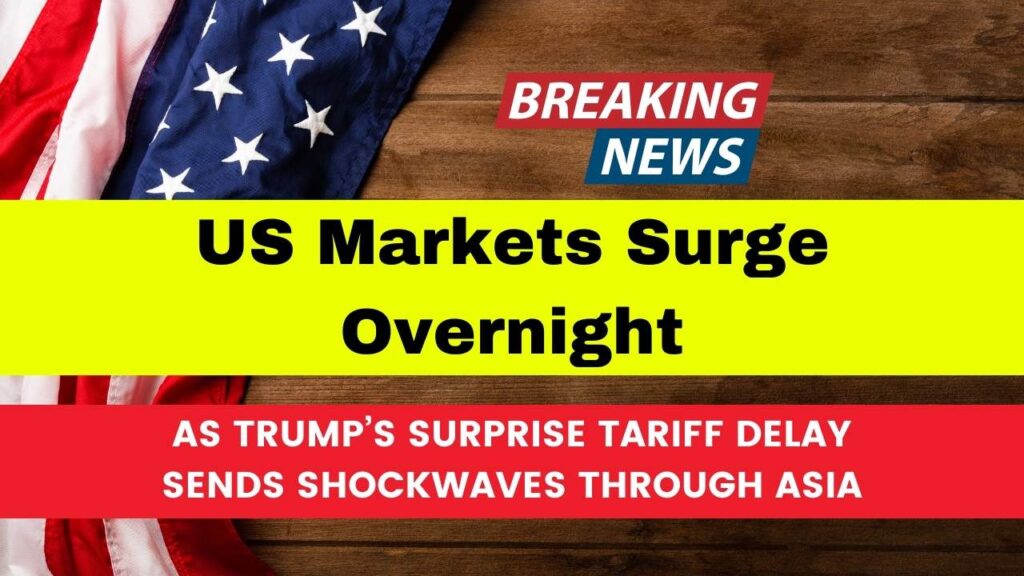
US Markets Surge Overnight: If you’ve been following the headlines this week, you might’ve noticed something big shaking up the financial world: US markets surged overnight after President Trump announced a surprise delay on tariffs targeting European Union (EU) goods. This move didn’t just cause a ripple—it sent shockwaves across Asia and global markets, and everyone from Wall Street pros to everyday investors felt the impact. Let’s break it all down in plain English, so whether you’re a 10-year-old curious about the news or a seasoned trader, you’ll leave with solid insights.
US Markets Surge Overnight
In a world where headlines move markets, Trump’s surprise tariff delay sent a jolt through US and global markets. While investors got a bit of breathing room, the trade drama isn’t over. Stay alert, informed, and prepared for the next chapter. Remember, what happens in Washington and Brussels can affect what’s in your shopping cart or retirement account.
| Aspect | Details |
|---|---|
| Event | Trump delays 50% tariffs on EU goods from June 1 to July 9 |
| Market Impact | S&P 500 futures up 1%, Dow Jones futures up 0.8% |
| Asia’s Reaction | Tokyo and Seoul posted gains; Hong Kong and Shanghai saw losses |
| Broader Implications | Continued uncertainty in global trade policies and potential for future market volatility |
| Official Resources | USTR.gov – U.S. Trade Representative |
What Happened and Why It Matters
Here’s the scoop: President Donald Trump had planned to slap 50% tariffs on EU goods starting June 1st, but in a surprise twist, he announced a delay until July 9th. This unexpected pause came after last-minute talks with European Commission President Ursula von der Leyen, giving the markets a temporary sigh of relief.
Why should you care? Because tariffs affect the prices of imported goods. If the US imposes steep tariffs, prices go up for everyone—consumers, businesses, and investors alike. Delaying them? Well, that’s like pressing a “pause” button on potential economic strain.
Historical Context: Why Tariffs Matter
This isn’t the first time the US has played hardball with tariffs. Remember the US-China trade war back in 2018–2020? Tariffs were slapped on billions of dollars’ worth of goods, affecting everything from smartphones to soybeans. Those moves rattled global markets and hurt industries like agriculture, tech, and automotive.
Tariffs are a tool countries use to protect domestic industries, but they can backfire. When prices rise, consumers and businesses feel the pinch. It’s a classic case of “you tax me, I tax you back,” which can spiral into a trade war—hurting everyone.
Expert Opinions and What Analysts Are Saying
According to Reuters and financial experts from Goldman Sachs, the delay in tariffs is a short-term win for markets but doesn’t remove the bigger uncertainty. Analysts warn that unless both sides—US and EU—reach a sustainable agreement, trade tensions could flare up again.
For tech giants like Apple and Samsung, the threat of additional tariffs (like the possible 25% Trump floated on non-US manufactured smartphones) could mean higher prices for consumers and a hit to profit margins. Apple’s stock, for example, dipped following these threats, reflecting investor jitters.
Practical Examples: How This Affects You
- Consumers: If you buy electronics, clothes, or food products imported from the EU, prices might have risen if the tariffs kicked in. Delaying them means those costs won’t hit you just yet.
- Businesses: US companies that rely on imported parts or materials can breathe a little easier for now, but they need to plan for possible tariffs later.
- Investors: The market bounce shows optimism, but this may be temporary. Staying diversified and keeping an eye on trade news is critical.
What This Means for Professionals
If you’re a business leader, investor, or entrepreneur, here are a few actionable insights:
- Review Supply Chains: Map out where your goods come from. Can you diversify suppliers or renegotiate terms if tariffs increase?
- Watch Tech and Manufacturing Sectors: These areas are especially vulnerable to trade tensions. Monitor news from companies like Apple, Samsung, and major automakers.
- Plan Financially: Consider hedging strategies or consult with a financial advisor to protect assets from potential volatility.
- Stay Informed: Follow updates from credible sources like Reuters, Investors Business Daily, and USTR.
Step-by-Step: How to Stay Prepared for US Markets Surge Overnight
Here’s a simple guide to help you make sense of the market buzz:
Step 1: Know the Players
Understand who’s involved—Trump’s trade team, the EU, Asian markets, and big companies like Apple and Samsung.
Step 2: Watch the Deadlines
Mark your calendar for July 9th—that’s when the new tariff decision comes into play.
Step 3: Diversify Your Portfolio
If you’re investing, don’t put all your eggs in one basket. Diversify across sectors and regions to cushion potential shocks.
Step 4: Stay Informed
Subscribe to financial news alerts or follow official sources like the U.S. Trade Representative.
Step 5: Talk to a Pro
If you’re feeling overwhelmed, talk to a financial advisor or investment expert. They can help you navigate tricky markets.
GOP Tax Bill Contains a Quiet Threat to Federal Workers; Could This Be the End of the Civil Service?
Proposed Medicaid Changes Could Devastate Kentucky Families—See What’s at Stake
Her Boyfriend Says 401(k)s Are a Scam; Dave Ramsey’s Response Left Her Speechless
Frequently Asked Questions (FAQs)
Why did Trump delay the tariffs?
It was part of negotiations with EU leaders to ease trade tensions and avoid a full-blown trade war.
How do tariffs affect everyday people?
Tariffs make imported goods more expensive. That could mean higher prices at the store, from food to electronics.
Will this delay stop a trade war?
It’s a temporary pause, but the bigger trade picture remains uncertain. Future negotiations will determine the long-term impact.
How can I protect my investments?
Diversify your portfolio, stay informed, and consult with a professional financial advisor.











